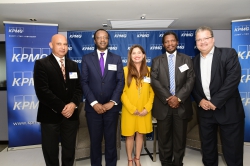KPMG - Higher Education stakeholders converge to discuss sustainable solutions for universities2016-03-16 KPMG 2016 Higher Education Conference â€" StatusQuoMustFall
14 March 2016 marked the second successful KPMG Higher Education Conference, which took place at the Coastlands Hotel in Umhlanga, KwaZulu-Natal. The conference was attended by key leaders in Higher Education and the speakers included industry experts who are akin to the unique challenges facing the sector. The guest list included Ranesh Sivnarain, (Chairperson of the Forum for Audit, Risk and Forensics and the Head of Forensics - University of KwaZulu-Natal), Professor Tawana Kupe (Deputy Vice-Chancellor- University of Witwatersrand) and Dr. Mvuyo Tom (Vice-Chancellor- University of Fort Hare) as well as representatives from the Auditor General. This year’s theme was, “#StatusQuoMustFall â€" KPMG and FARF Creating sustainable solutions for Universitiesâ€. The theme was selected to create a platform for engagement on how governance mechanisms can add much needed value to safeguarding the assets of institutions and contribute to their future viability. The conference was a phenomenal success, with over 120 delegates who represented 23 of South Africa’s leading Public Higher Education Institutions (and numerous other industry experts) attending and participating in important Governance and Forensics discussions. “We firmly believe that this conference was a springboard and a way to foster optimal learning environments for all our citizens â€" shifting the focus from disruption to quality Education. It was a powerful and interactive conference whose outcomes vividly defined that this can only be achieved through continual candid conversations and engagements with all stakeholders, sharing of best practises and optimisation of university business models. Future generations are dependent on us being market leaders, collaborators, innovators and influencers, addressing the challenges in this sector with courage, agility and integrity,†said Farzanah Mall, KPMG Director and KPMG Higher Education conference Lead. With significant pressure being applied by both internal and external stakeholders after the “#FeesMustFall†protests, it is without a doubt that the current Higher Education environment is extremely volatile. In addition to the challenges posed by operating in such a tumultuous environment, Universities are also facing a multitude of internal hurdles including uncertainty over their future funding model, rising student expectations and rapidly changing playing fields, driven by the technological revolution and the urgent cries to democratise education. Undoubtedly, everyone has the right to further education, which the state, through reasonable measures, must make progressively available and accessible. Even though much has been done to redress the imbalances, the conference revealed that South Africa’s education systems and skills development programmes are not responding adequately to the demands of society and the economy. In an interconnected world, with an accelerated pace of change, effective risk management is critical for the achievement of South Africa’s developmental objectives. KPMG, through its team of local and international Higher Education experts, is committed to supporting the sector to address the myriad of internal and external factors impeding the success of the country’s educational institutions. Granville Smith, Director: KPMG National Head of Higher Education, urges all role players to take note of Nelson Mandela’s quote, “Education is the most powerful weapon you can use to change the world.†As Governance Advisors, it is now of paramount importance that we do our bit to help improve this “production plant†of our economy â€" whether it be collating and bringing together the ideas and solutions which are often never heard, or strategically aligning mandates to results. Ranesh Sivnarain, Head of Forensics UKZN says, “We have to prevent wasteful expenditure by holding employees and management responsible and accountable. The most robust antifraud strategies and interventions will not fully succeed unless we inculcate a sound ethical culture amongst our staff, students, suppliers and other stakeholders.†Emanating from KPMG’s commitment is the KPMG 2016 Higher Education publication. Readers will be exposed to a wealth of content addressing the education challenges and includes contributions from the Vice-Chancellor of the University of KwaZulu-Natal and other industry and KPMG experts. The publication is thought provoking and provides new ideas and thinking on Education. ENDS |
KPMG - Higher Education stakeholders converge to discuss sustainable solutions for universities
Copyright © 2024 KwaZulu-Natal Top Business
